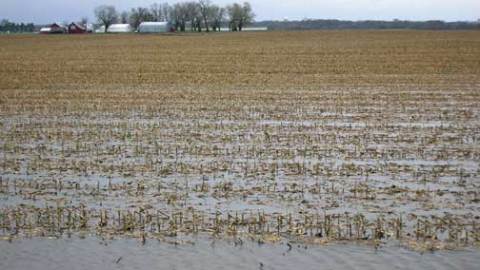As Congress Debates the EPA’s Regulation of Greenhouse Gas Emissions, More Focus Should Be on Adaptation

In a guest post today, Ashley Brosius a graduate student in my “Science, Environment, and the Media” course this semester discusses the need for greater focus on adaptation policy related to climate change — Matthew Nisbet.
The beginning months of 2011 feature a Republican-controlled U.S. House with a clear agenda that focuses on preventing domestic climate change legislation, stripping the Environmental Protection Agency of the ability to regulate emissions, and cutting climate change funding. It seems rather odd to see this polarization of the issue along party lines. Environmental issues have historically been non-partisan. After all, Richard Nixon called for the creation of the Environmental Protection Agency.
Yet many Republican leaders, in direct defiance of overwhelming scientific consensus, reject the notion that man-made activities are contributing to climate change and instead insist that the rise in Earth’s temperatures is due to natural cycles. A smaller number deny even that climate change is occurring at all. An even stronger focus by Republicans, however, has been on the economic dimensions of the issue. Republicans claim climate change legislation would cripple the US economy and kill jobs. Democrats from industrial and farm states are additionally reticent to act on regulating climate change emissions, fearing how it would impact key constituencies.
Framing Climate Action in Terms of Economic Costs
The economic argument was the principle frame used by House Republican leadership to end the House Select Committee on Energy Independence and Global Warming. A NY Times article quotes Speaker of the House John Boehner’s as arguing this dominant economic frame of reference: “The Select Committee on Global Warming was created by Democrats simply to provide political cover to pass their job-killing national energy tax.”
Putting this economic frame into action, the House subcommittee on Energy and Power approved the “Energy Tax Prevention Act,” which would prevent the EPA from acting on regulating greenhouse gas emissions. The bill was then voted on in the House Energy and Commerce Committee, passing 34-19. The vote was mostly split down party lines with all Republicans on the Committee voting in favor of the bill and only three Democrats approving the bill.
Meanwhile in the Senate, Minority Leader Mitch McConnell, R-KY, moved to add the Energy Tax Prevention Act written by Senator James Inhofe of Oklahoma as an amendment to a small business bill. Bill supporters are hoping to procure the necessary votes to pass the bill and permanently block the regulatory ability of greenhouse gas emissions. One of Senator Inhofe’s more infamous quotes includes him calling climate change “the greatest hoax ever perpetrated on the American people.” If both the Senate and House approve the Energy Tax Prevention Act, it will be up to Obama to veto the bill to ensure emissions regulation remains with the EPA.
Democrats Reticent to Act Following Midterm Election
However, it is also important to highlight Democrats’ current position on climate change, especially given the recent mid-term elections. With the GOP winning the majority of the House, cap-and-trade support was initially blamed for the lost Democratic seats. Politico noted in its article titled “Democrats day of reckoning comes for climate vote” that Democrats who supported the House climate bill had lost their seats.
Yet, other media outlets reported that the support for the bill did not factor into the Democrats’ losses. The NY Times noted prominent climate supporters and deniers alike that won their elections, including climate supporters Rep. Edward Markey and Rep. Jay Inslee and climate skeptic Rep. James Sensenbrenner. The Wonk Room noted that 81 percent of Democrats voting for the climate bill won their races while 64 percent of Democrats voting against the climate bill lost their seat.
Though in isolation, the cap and trade bill did not doom Democrats, the bill did become part of a larger “big government” narrative linked to “Obamacare” and “tax and spend” policies that helped push Republicans to victory in the Midterm election. Indeed, the Midterm election seems to have made some Democrats grow even more reticent about publicly supporting action on climate change, including President Obama. The phrase climate change was even absent from Obama’s State of the Union Address this year, who in the past had said “few challenges facing America—and the world—are more urgent than combating climate change.”
Why Greater Investment in Adaptation is Needed
Differing ideologies bring individuals to different conclusions and to prioritize issues accordingly. Yet, even if one doesn’t believe in man-made climate change, this belief does not negate the urgent reality that climate change threatens the health and well-being of Americans and their communities.
With meaningful legislative efforts at mitigating climate change stalled until at least after the 2012 elections, it is important that the Obama Administration focus additional resources on adaptation. A past article by Roger Pielke Jr. and colleagues discusses adaptation as a policy tool, a once taboo topic but an area of needed action gaining increased emphasis and consideration.
Much of the argument behind adaptation lies in the fact that climate change will continue to happen even if the world becomes carbon neutral tomorrow. The effects are unavoidable. Adaptation acts as a mechanism to increase the resilience of communities and regions that will be impacted by climate change related phenomena such as prolonged droughts, increased wild fires, increased flooding, stronger hurricanes, and heat waves.
Adaptation strategies include evacuation plans for coastal areas or cooling centers for those suffering from heat waves. These measures could be viewed as initiatives for urban development or for disaster-risk reduction, actions communities should be taking even without the added risks posed by climate change. Smaller in scope and more locally focused, these actions are also likely to be less politically gridlocked since they offer many immediate co-benefits to the public
Since different regions of the United States will feel the impacts of climate change differently, adaptation strategies need to be tailor-made to the specific needs of those regions or of particular states. The risks faced by a coastal state will not be the same as the effects felt in the Midwest of the country. These varying impacts require local and regional action, requiring Federal support and coordination, but also intense state and local government involvement. To catalyze this government action, environmental groups, scientists, and other societal opinion leaders such as public health officials need to elevate attention to the need to adaptation.
–Guest post by Ashley Brosius, a MA student in Natural Resources and Sustainable Development at American University. Brosius holds a BA in Biological Sciences from Clemson University and her current academic interests focus on climate change adaptation and climate change communication.
This post is part of the course “Science, Environment, and the Media” taught by Professor Matthew Nisbet in the School of Communication at American. See also other posts on the climate change debate by Ms. Brosius and members of her project team.





